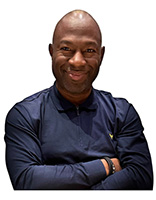Voices of Black History Month
 Voices of Black History Month
Voices of Black History Month
Adebayo Oyeniyi (Ade), Head of Operations
In celebration of Black History Month, we’re speaking with Advance customers and team members to understand what the commemorative month means to them.
Here, Adebayo Oyeniyi, known as Ade, gives his perspective on Black History Month.
Having worked in the housing sector since 2002, Ade joined Advance 13 years ago as an operations manager and became Head of Operations in 2022.
What does Black History Month mean to you?
I grew up in Nigeria, where my experience of being Black was very different from those born and raised in the Western world. Surrounded by people of my own colour, I did not face discrimination linked to race, and neither my parents nor grandparents lived through the historic struggles that shaped the lives of Black communities in the West.
When I moved to England over 20 years ago, I became more aware of the deep feelings and lived experiences of Black people here. It became clear to me that, while I may not fully share or comprehend every aspect of that history, I can appreciate its significance and stand alongside those for whom it carries personal meaning.
Why is it important to celebrate Black history in our communities?
As a senior manager running services in some of the most diverse communities in the country, I see how important it is to respect these different perspectives. For some people, Black History Month is deeply personal; for others, it is about solidarity and learning. My role is to ensure that our teams create space for both – where customers and colleagues feel recognised, included and supported.
Inclusion is central to good support. When we listen to people’s histories and identities, we build trust, create a sense of belonging and improve outcomes. Black History Month reminds us of that responsibility as leaders.
How does Advance make you feel included and valued?
Advance takes equality and diversity very seriously. I’m part of the Equality, Diversity and Inclusion (EDI) team, which is chaired by the CEO. We look at EDI statistics, such as the number of colleagues from different minority ethnic groups and figures around pay gaps, to ensure everybody is well represented and valued within the organisation.
With Advance, everyone has the opportunity to progress in their careers. For example, I am part of the senior management team, which shows that there's no discrimination here. There’s also training given to everyone on subjects such as unconscious bias, which helps create awareness. All of that helps to make you feel valued as an employee.
What does inclusivity look like to you?
When people are given that opportunity to be themselves, to be heard, to be listened to, irrespective of your race, gender or colour. Also to be given equal opportunities, for example, if you want to progress your career. It’s also important to celebrate everyone within the organisation and their contribution, whoever they are and wherever they are from.
How can organisations continue to celebrate diversity and promote inclusion all year round, not just during Black History Month?
Creating awareness through training is essential – and also having an EDI team or similar kind of forum which seeks to ensure everyone is recognised, regardless of race, colour or gender. Our EDI team is always open to ideas about how people in minority groups can feel more acknowledged and appreciated.
At Advance, we’ve created a calendar of dates when people from different groups and backgrounds are recognised, so activities can be planned to celebrate them, their history and their achievements.